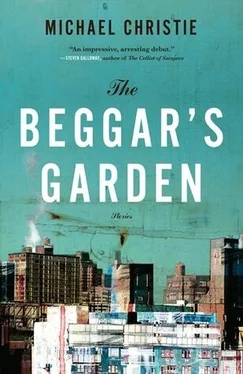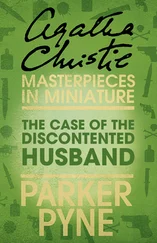Some weeks later she quit Woodward’s after twenty years there and set up a thrift shop just three blocks away in the basement of New Westminster United. She began by handing out the sweaters and slacks Gus had left swinging in their closet to some old down-on-their-luck drunks and went from there. Shortly after she left Woodward’s, the department store slid into decline, and she liked to imagine it was due to her absence, though it was probably the malls and ever-bigger stores she’d heard were going up all over. Woodward’s finally declared bankruptcy in 1993, and with it died the last reason for decent people to come down to this neighbourhood, once the teeming commercial hub of the city, now staggering deeper and deeper into the woods of poverty, neglect and despair. All the old businesses on Bernice’s block had long vanished, swapped for cheque-cashing places, pawn shops and convenience stores. Over the years, through her thrift-store window, she’d watched the crippled loggers, hobos and drunks — battered leftovers of the city’s industrial heritage — joined by the heroin junkies, who were joined by the crack addicts and then by those suffering every other variant of destitution. It became a neighbourhood at which people in their downtown-bound cars gawked like they were on safari. She’d seen social services come and go like occupying armies, stuffing her mailbox with their optimistic, densely acronymed brochures. Most of them seemed out to get the poor wretched people more money, which to Bernice was much like heaving a thirsty man overboard, but she tried not to judge the social workers either. They were all trying their best.
The decline had only deepened the need for her services, and Bernice had to find volunteers like Tuan just to keep clothes on the racks. Busy as it was, the store only narrowly broke even. “As long as you need it,” Bernice would say to her pitiful customers, punching No Sale, a button more worn than any other on the register.
That afternoon she and Tuan were organizing the shoe racks, combing them for singles — what she called shoes without a mate.
“I’m leaving the store. For good,” she said, trying the words out, listening to how they sounded amidst the shelves of used cookbooks and the mannequins in the display window.
“Thank you,” he said, relacing a pair of brittle, yellowed boat shoes. Tuan was volunteering at the store while the pastor and his wife helped him with his immigration application. Bernice never tried to correct his English because she didn’t want to offend him. The pastor once said Tuan had a master’s degree in philosophy, so she figured he’d pick it up soon enough. Anyway, she liked small talk kept to a minimum.
“This ones is stink,” Tuan said, pinching his nose, dangling a pair of steel-toed boots like roadkill before venturing out back to toss them in the dumpster.
Alone, she surveyed the store. There was, as always, much to do: organizing, pricing, sorting, displaying. This was no junk shop. When second-hand things were presented well, with care — techniques for which she’d learned at Woodward’s — clothes folded or carefully hung, books categorized and alphabetized, knick-knacks arranged attractively, they became items folks could picture in their homes, welcome into their lives.
“Donation!” she heard Tuan yelp from out back.
Lately, more donations were arriving than she knew what to do with, the two storerooms nearly to the roof with them. The rear doors of the church opened to a squalid alley where they pulled up in all sorts of vehicles to pop their trunks, lift their hatchbacks, say this can go, and this, and this, handing Tuan and Bernice their garbage bags and boxes. The donors were always pleasant but seemed uneasy, uttering few words. Perhaps they were ashamed of their surplus, Bernice had often thought, the sheer weight of it.
Today it was a tall, stately woman, definitely a women’s ten in shoes, with sunglasses nested in her hair and cheekbones that rose neatly on her porcelain face. From her silver vehicle climbed down an unsteady, moon-faced girl in a princess dress. Flakes of sun leapt from her plastic tiara.
“Give the bag to the nice lady like we talked about,” the woman said to the girl, who took careful steps toward Bernice as though approaching a windy cliff. Bernice had been witness to these lessons in charity before, parents sandbagging Christian values nice and early in hopes they wouldn’t be washed out in the tsunami of adolescence. In the girl’s eyes, Bernice knew, she probably seemed something closer to witch than saint.
“These are my clothes,” the princess said.
“They don’t fit you anymore, Cricket,” her mother said.
“What if I shrink?” the girl bleated, pressing the bag to her bulbous, sequined belly.
“Now that’s enough of this,” her mother said, checking a thin gold watch riding the underside of her wrist. “Let’s get moving.” She reached into the back seat and set the last of their unwanted stuff at Tuan’s feet. “Now,” she ordered, and Bernice caught a whiff of the woman’s minty gum.
“Will you promise to take care of my clothes?” the princess asked Bernice.
“Oh, certainly,” Bernice said, keeping to herself the fact that other kids would likely soon be wearing her clothes, possibly muck-seeking children who might not take care of them at all. The girl knotted her glassy lips and handed over the bag.
As she watched them drive off, Bernice envied the rush of benevolence and general lightness these donors must feel returning to their homes, suddenly unburdened, free from what they no longer wanted or needed. She and Tuan dragged the donations into the storage room, where they could be gone through, appraised. Few of Bernice’s customers had kids, so the princess’s clothes would go to a shelter for battered women and their children a few blocks over.
Opening the boxes and bags was always thrilling, like the unsealing of mummies’ tombs or the vaults of gangsters. As a girl, she’d dreamed of becoming an archaeologist until she discovered how many years of schooling were required and turned her ambitions toward more modest, attainable goals.
The most startling treasures she unearthed were the brand new or the valuable: clothing still tagged or wrapped in tissue paper; unopened specialty appliances like rice cookers or fruit dehydrators; futuristic basketball shoes, their jumping springs never tested; designer labels she vaguely recognized from billboards. Once there were sixteen mason jars full of change, mostly silver, that she’d dumped into the church collection bucket upstairs; and always plenty of new dishes and kitchenware still stickered with prices of magnitudes that never failed to astonish her. Could they all be unwanted gifts? If not, how could someone pay so much for things they didn’t need? And if they had once needed them, what had happened in between?
Equally baffling were the odd and used-up things the donors somehow imagined the poor could actually use: cracked helmets, expired urine-smelling vitamins, tiny musical instruments, perfumed negligees, mute synthesizers, their keys greyed with skin cells, couches shot through with black mould, long-expired canned goods, sacks of wormy flour, bloodstained sheets, broken crutches, ten-year-old phonebooks. She’d once got a silk parachutist’s jumpsuit decorated with fluorescent polygons, and Bernice and Tuan roared at the thought of one of her customers sporting it to collect bottles then falling asleep in a park like an off-duty superhero. But it disturbed her, the way people failed to distinguish what was useful from what wasn’t. The ability to do so seemed to her an inseparable part of getting by in this world.
She tore into the princess’s mother’s boxes, and under some musty, purple fitted sheets, inside a faux-rosewood case, she found a velvet pouch of collector’s souvenir spoons. Shuffling them, she picked out the only one she didn’t already have, its handle grazed upon by a gilded buffalo. She fogged it with a breath, polished it on her slacks, then held it up.
Читать дальше












